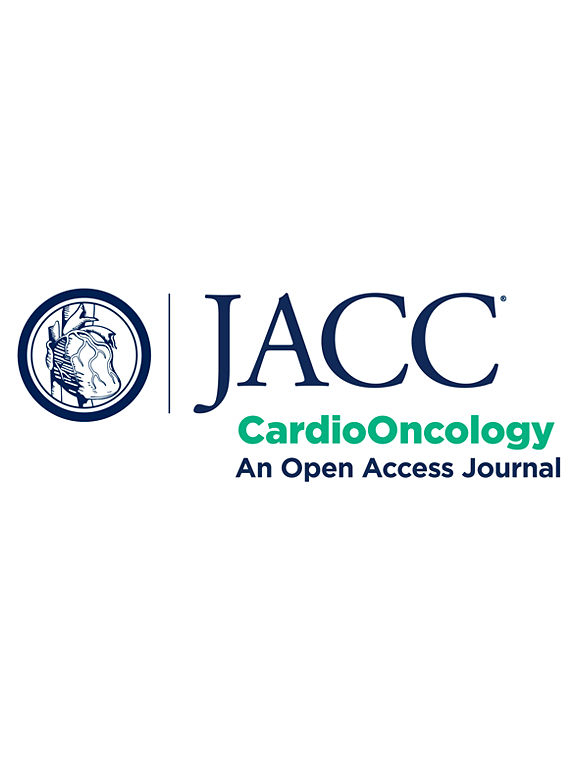Risk of Cardiovascular Disease in Cancer Survivors after Systemic Treatment
IF 12.8
1区 医学
Q1 CARDIAC & CARDIOVASCULAR SYSTEMS
引用次数: 0
Abstract
Background
Patients face an increased risk of cardiovascular disease shortly after a cancer diagnosis, but evidence on long-term risk among cancer survivors remains limited.
Objectives
In this study the authors sought to estimate the risk of cardiovascular disease in cancer survivors previously treated with systemic cancer therapy.
Methods
Using Danish population-based registries, we identified individuals who had received systemic cancer treatment and were free of both cancer and treatment 3 years after diagnosis (index date). For each cancer survivor, 5 cancer-free individuals from the general population were randomly selected, matched by birth year, sex, and calendar year. Participants were followed from the index date for up to 5 years. HRs were estimated using Cox regression, adjusted for potential confounders.
Results
Compared with 457,035 matched individuals, the 91,407 cancer survivors had an increased risk of heart failure or cardiomyopathy (HR: 1.08; 95% CI: 1.02-1.15), venous thromboembolism (HR: 1.50; 95% CI: 1.41-1.61), pericarditis, endocarditis, or myocarditis (HR: 1.30; 95% CI: 1.11-1.52), and kidney failure (HR: 1.17; 95% CI: 1.10-1.25), but not of ischemic heart disease, stroke, or atrial fibrillation. Estimates varied substantially by cancer type and treatment agent. For example, venous thromboembolism risk was consistently increased across nearly all cancer types, whereas hypertension risk was elevated for none. Ischemic heart disease risk was increased only among lung cancer survivors. Stroke was associated with platinum compounds but not with other systemic treatments.
Conclusions
Several cardiovascular disease risks were elevated among cancer survivors, with substantial variation by cancer type and treatment.
系统性治疗后癌症幸存者心血管疾病的风险
患者在癌症诊断后不久面临心血管疾病的风险增加,但癌症幸存者的长期风险证据仍然有限。目的:在这项研究中,作者试图评估以前接受过全身癌症治疗的癌症幸存者发生心血管疾病的风险。方法采用丹麦人口为基础的登记处,我们确定了接受过全身癌症治疗的个体,并且在诊断后3年(索引日期)没有癌症和治疗。对于每一个癌症幸存者,从普通人群中随机选择5个无癌症的人,根据出生年份、性别和日历年进行匹配。从指数日期起,参与者被跟踪长达5年。hr使用Cox回归进行估计,并对潜在混杂因素进行调整。结果与457,035名匹配个体相比,91,407名癌症幸存者患心力衰竭或心肌病的风险增加(HR: 1.08;95% CI: 1.02-1.15),静脉血栓栓塞(HR: 1.50;95% CI: 1.41-1.61)、心包炎、心内膜炎或心肌炎(HR: 1.30;95% CI: 1.11-1.52)和肾衰竭(HR: 1.17;95% CI: 1.10-1.25),但与缺血性心脏病、中风或房颤无关。估计因癌症类型和治疗药物的不同而有很大差异。例如,几乎所有癌症类型的静脉血栓栓塞风险持续增加,而高血压风险没有升高。缺血性心脏病的风险仅在肺癌幸存者中增加。中风与铂类化合物有关,但与其他全身治疗无关。结论癌症幸存者中几种心血管疾病的风险升高,因癌症类型和治疗而有很大差异。
本文章由计算机程序翻译,如有差异,请以英文原文为准。
求助全文
约1分钟内获得全文
求助全文
来源期刊

Jacc: Cardiooncology
Multiple-
CiteScore
12.50
自引率
6.30%
发文量
106
期刊介绍:
JACC: CardioOncology is a specialized journal that belongs to the esteemed Journal of the American College of Cardiology (JACC) family. Its purpose is to enhance cardiovascular care for cancer patients by publishing high-quality, innovative scientific research and sharing evidence-based knowledge.
The journal aims to revolutionize the field of cardio-oncology and actively involve and educate professionals in both cardiovascular and oncology fields. It covers a wide range of topics including pre-clinical, translational, and clinical research, as well as best practices in cardio-oncology. Key areas of focus include understanding disease mechanisms, utilizing in vitro and in vivo models, exploring novel and traditional therapeutics (across Phase I-IV trials), studying epidemiology, employing precision medicine, and investigating primary and secondary prevention.
Amyloidosis, cardiovascular risk factors, heart failure, and vascular disease are some examples of the disease states that are of particular interest to the journal. However, it welcomes research on other relevant conditions as well.
 求助内容:
求助内容: 应助结果提醒方式:
应助结果提醒方式:


